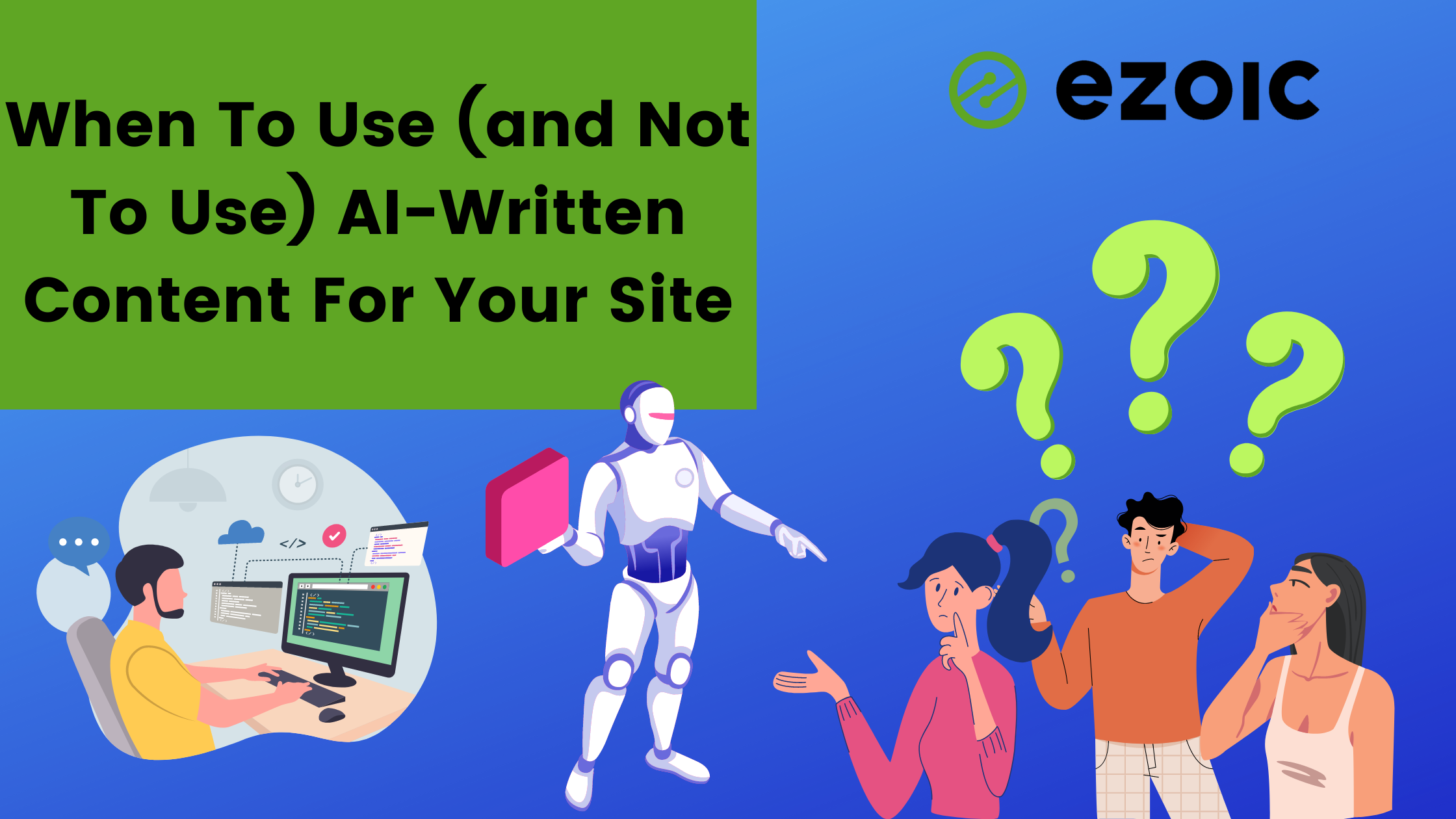AI-written content has recently experienced a sharp increase in popularity and interest, partly due to the exponential advances in natural language-generation (NLG) artificial intelligence can produce. In response to the ever-increasing level of website competition and more stringent SEO policies, publishers have begun looking to artificial intelligence to help them write their content — or even create it in full.
But using AI to write your content for you can be fraught with difficulties. Senior Webmaster Trends Analysts at Google John Mueller recently said Google considers automatically generated content (AI-written content) as “spam” for violating Google’s Webmaster Guidelines. Language Industry Intelligence agency Slator further explained that “According to Google, AI content is generated programmatically. Therefore, because there is a high possibility that AI content can be used to manipulate search rankings (i.e., SEO) rather than help users, Google may take action.” Yikes.
We haven’t even mentioned the public perception of AI-written content, which is notably low. As the content marketing agency CopyPress noted from a recent survey, a majority of publishers don’t think that highly of the future of AI content:
Social Media agency Buffer echoed this sentiment: “Even though AI can create content based on the facts and stats that it collects from the web, it can’t develop empathy, creativity, and emotions. It doesn’t have the capacity for storytelling that humans have.”
No computer has ever passed the famous Turing Test (no, not even Google’s AI); humans simply know when they’re dealing with a person or dealing with a computer. And if you’re desperately searching for ways to stop a baby from crying or how to get over a breakup and you realize a computer is trying to give you answers…well, it’s easy to imagine users abandoning that content as soon as they can. There are some things AI just shouldn’t try to write.
This may lead you to naturally ask the question: is there ever a time when a publisher should use AI-written content?
Surprisingly, the answer is yes — if you know how. This is a simple guide to help you know when to use (and definitely not to use) AI-written content for your site.

When To Use AI to Write For Your Site
Although AI-written content has gained enormous popularity this past year, the industry itself has been active for several years (Alan Turing and his team had begun to study AI content in earnest as early as 1947). Forbes noted in early 2019 that reputable news sources like the Washington Post, Associated Press, and even The New York Times were using AI to generate content for their site.
Of course, this AI wasn’t writing poetry or creative fiction. But it was actually very useful for efficiently organizing large data onsets to accomplish tasks, like creating 401K portfolio summaries for employees, publishing sports reports, fact-checking data, even posting simple updates on social media.
In short, we’re talking about commodity information: financial news, sports reports, weather updates, data analysis, and the like — stuff readers don’t mind hearing from a computer. The truth is, you don’t need a human to create every piece of content; AI can sort and analyze data infinitely faster than humans, and can produce text summarizations that are actually useful for readers.
You don’t need to rely on content AI to write all your text for you; you can simply use it as a spark for brainstorming ideas and developing new creative angles for your articles. Up to 57% of bloggers believe daily posting is beneficial…that’s a lot of article ideas per month (not to mention writing them!). Content AI can help you come up with more ideas, analyzing industry data to help you come up with new, interesting, unique, and relevant content.
According to digital brand agency ThemeIsle: “The greatest advantage of using an AI content writer tool is that it provides the ability to produce and publish more content in less time. This can be an excellent way for marketers to increase their content output without having to spend hours researching and crafting blog posts.”
Think of content AI as a writing assistant; it can help give you ideas for content, overcome writer’s block, and scan your current content to look for ways to optimize and improve it. It’s a bit like hitting the cruise control button on your car; it’s not going to safely drive you through busy intersections, but it can help you for certain stretches of your journey.

When to Not Use Content AI For Your Site
One of the hardest, most difficult skills for publishers to learn is writing.
Publishers may be world-class experts in their field, but communicating and teaching that expertise is an entirely different skill set. How many former professional athletes became terrible coaches or team owners? How many great salespeople proved to be poor sales managers? It’s one thing to know; it’s another thing entirely to know how to teach others.
That’s one of the reasons many publishers have considered using AI-written content as their main content generator. It makes sense from a big-picture perspective: it’s fast, easy, infinitely scalable, and completes a difficult task for you.
But publishers who publish AI-written content in the wrong places don’t just risk earning one (or many) Google penalties for their site, they risk repelling their entire audience.
There are countless examples of poorly written AI content that instantly makes readers laugh at how ridiculous it sounds (just look at one AI’s attempt to write a Batman movie script). Now imagine a reader coming to a site and seeing content like this that the site owner expects their readers to appreciate. It’s not just foolish; it’s insulting. It’s like trying to have a serious conversation with a telemarketer bot over the phone. People will leave instantly.
You should not use AI-written content on sites where people absolutely need a human touch. Niches like personal development, spirituality, relationships, beauty, and parenting come to mind; imagine a computer trying to tell you how to pray better, overcome addiction, or connect with your daughter with autism more.
The most difficult problem with using AI-written content is twofold: how to stay in Google’s good graces, and how to deliver content your readers actually appreciate. The best AI-written content is usually short form data analysis and updates that don’t require personality or empathy.
Don’t use content AI to try and reach your audience on a deep, personal level. If you replace your unique tone of voice with that of a computer, you won’t just attract Google’s displeasure, but your entire audience’s too.
In Conclusion
AI-written content is controversial, to say the least. Some publishers prize this asset as a resource to help them use algorithms to write enormous amounts of content very quickly; other publishers are vehemently outspoken about how AI-written content can never replace human writers.
There’s a plethora of benefits from using AI to generate (certain) types of content for you. You’re able to tap into the power of infinite scalability and computer-generated efficiency.
But there are several drawbacks to this strategy, and if you’re not careful you risk having your site penalized by Google. AI can write code, articles, even make images/videos, and they might even be good sometimes.
But AI has to be told what to do, often with exacting precision; sure it can accomplish some tasks faster than humans, but if you have to tell a tool what to do with extreme detail for every task it does, AI can become a cumbersome solution very quickly.
In short: use AI-written content sparingly. It works best as a jumpstart for creativity, a writing assistant instead of your main content writer. Just like any other tool, AI-written content can help your site in enormous ways…if you take the time to learn how to use it.


